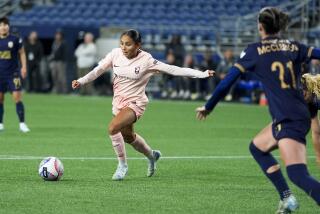With Olympic 200 gold in hand, Allyson Felix asks: What’s next?
- Share via
Pursuing her dream had so completely consumed Allyson Felix that after she won the gold medal in the 200 at the London Olympics, the woman who so perfectly combines grace and power was, for once, unsure of her next steps.
Motivated by runner-up finishes in Athens and Beijing in the race she calls “my baby,” the Los Angeles Baptist High and USC graduate devoted all her energy to succeeding in London. She tried running the 400, but it depleted her in the 200; she found the 100 was better preparation. Because of that, she was willing to compete in a runoff for the final Olympic berth after she and Jeneba Tarmoh tied for third in the 100 at the U.S. trials, a point that became moot when Tarmoh withdrew before the scheduled tiebreaker.
Felix’s perseverance paid off in London, where she won the 200 in 21.88 seconds and finished fifth in the 100 in a personal-best 10.89 seconds. She added gold medals in the 400-meter relay by contributing the second leg in a world-record 40.82-second performance, and by running a blistering second leg in a 3-minute, 16.87-second triumph in the 1,600-meter relay, becoming the first female U.S. track athlete to win three golds at one Olympics since Florence Griffith-Joyner in 1988.
But she had most craved victory in the 200, and it left her to face questions she had never contemplated before:
What’s next? How do you follow up achieving your lifelong goal?
“I’m not sure,” she said a few days ago. “The way I look at it is that I had this amazing dream come true for me, that it took me so long and such a journey to get to, and now I’m still enjoying running and still passionate about it and so I’m going to continue on for now.
“We have World Championships next year and I would love to do one more Olympic Games. I don’t know if I would stay with the 100 and 200 or finally branch out, but I’m just kind of exploring where I’m going now.”
Felix, who will be 27 on Nov. 18, competed in two races soon after the Olympics but otherwise relaxed, allowing her mind and body time to rejuvenate. She will resume light activity this week and soon after will resume training at UCLA with coach Bobby Kersee and begin to map out her running future.
“My thinking is as I get older it may be easier on my body to do the 400,” she said. “I’m just going to see how it goes with the sprints, but I’m definitely open to doing that, and if it comes up for the next Olympics that’s something I would be feeling more comfortable with as I get older.”
But she’s not through with 100 and 200, especially after running a blazing 21.69 in the 200 at the Olympic trials, the third-best time by an American woman.
“I feel like right now I’m in my prime. This is the prime age for a female sprinter,” she said. “The next year or two I feel like that’s really the time I can try to improve on my personal bests and do those things.”
In the meantime, she has expanded her focus beyond the track.
Felix is preparing for a mid-November trip to Rwanda, Uganda and Tanzania for Right to Play, the humanitarian organization founded by Olympic speedskater Johann Olav Kossto promote the development of education, health and leadership skills through sports. A year ago she visited Lebanon and the Palestinian territories to work with kids and was thrilled when they made a video to cheer her on at the Olympics.
“Instead of doing a bunch of smaller things for charities, I wanted to just invest my time into one charity that I could get hands-on,” she said. “I felt like before, I was doing things and you lend your name to different things but you don’t feel invested.”
The only downside of the journey is it will prevent her from using her Lakers season tickets. “I’m very excited about the team. I definitely think they’ll do much better this season,” she said.
If their season is even a fraction as good as hers, they’ll be in good shape.
Twitter: @helenenothelen
More to Read
Go beyond the scoreboard
Get the latest on L.A.'s teams in the daily Sports Report newsletter.
You may occasionally receive promotional content from the Los Angeles Times.







